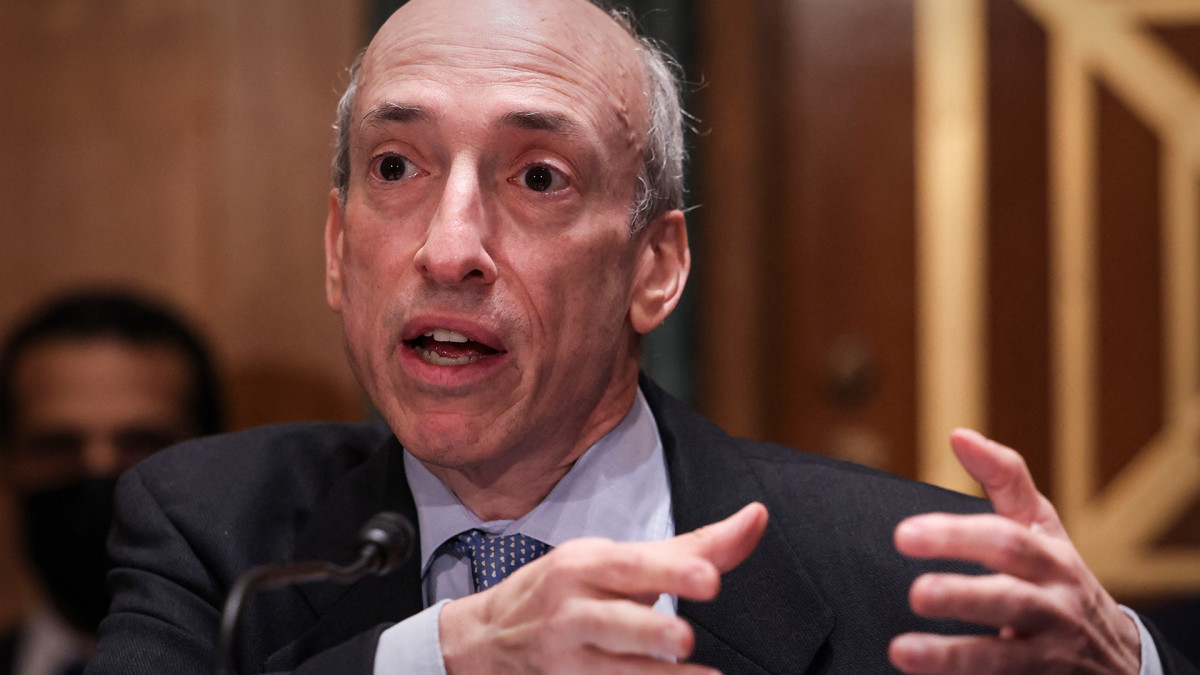
On March 26, 2021, a company called Archegos Capital Management defaulted on margin calls from several investment banks.
The collapse of the firm, which was founded and run by the investor and trader Bill Hwang, rattled some of the biggest names on Wall Street, including Credit Suisse, which collapsed last year after a series of scandals.
Investigators charged Hwang, who reportedly lost $8 billion in 10 days, and three others with racketeering conspiracy, securities fraud and wire fraud offenses. He is currently on trial in federal court in Manhattan.

EVELYN HOCKSTEIN/POOL/AFP via Getty Images
The case intensified the government's investigation of block trades, which are large, privately negotiated securities transactions. The New York Stock Exchange defines a block as at least 10,000 shares or a quantity of stock having a market value of $200,000 or more, whichever is less.
"Prior to the 1960s, the individual investor was the dominant public participant in the stock market," author Gary L. Gastineau wrote in 1991. "The growth of institutional investors in the late 1960s created demand for trading large blocks of stock."
Early in 2022, Reuters reported that the U.S. Securities and Exchange Commission was investigating whether certain banks may have broken the rules by tipping off hedge funds ahead of block trades.
The investigation heated up following the collapse of Archegos, but block trades were already under scrutiny when the highly leveraged family office imploded, Reuters reported.
Agencies investigate Morgan Stanley
Federal investigators began focusing on trades carried out by investment giant Morgan Stanley (MS) -) a day before the wider selloff wiped out $35 billion from the value of Archegos's holdings, according to Bloomberg.
The firm reportedly lost nearly $1 billion when Archegos went under.
And that led to scrutiny of Pawan Passi, a senior executive at the bank, who had spoken about various block trades.
Related: Software giant to pay over $220 million to settle foreign bribery charges
Now block trading is at the heart of a federal complaint lodged against Morgan Stanley and Passi by the SEC and U.S. Attorney's Office.
Federal officials charged the investment banking giant and Passi, the former head of its equity syndicate desk, with a multiyear fraud involving the disclosure of confidential information about block trades from at least June 2018 through August 2021.
The SEC said on Jan. 11 that Passi and a subordinate disclosed nonpublic, potentially market-moving information concerning impending block trades to select buyside investors — despite the sellers’ confidentiality requests and Morgan Stanley’s own policies regarding the treatment of confidential information.
Morgan Stanley failed to enforce information barriers to prevent material nonpublic information involving certain block trades from being conveyed by the equity syndicate desk, which sits on the private side of Morgan Stanley, to a trading division on the public side of the firm, the commission said.
As a result, the firm was unable to sufficiently scrutinize whether trades by that division, placed while the equity syndicate desk was in discussions with selling shareholders regarding potential block trades, were based on such confidential discussions.
SEC Chairman Gary Gensler said that Morgan Stanley and Passi "abused that trust by leaking that same information and using it to position themselves ahead of those trades.
"While their conduct may have earned them tens of millions of dollars on low-risk trades, it violated the federal securities laws," he said.
Feds: 'Block sellers were deceived'
U.S. Attorney Damian Williams said in a statement that Morgan Stanley, through Passi, "deceived block sellers by promising confidentiality knowing that they would turn around and share that information with others to use to trade."
More from Wall Street Analysts:
- Analyst: Beloved retailer headed for Chapter 11 bankruptcy
- Fund manager who correctly predicted yields would drop reveals top stocks for 2024
- Apple or Microsoft: Analyst explains the biggest value-deciding factor
Williams added that “while many factors weighed in Morgan Stanley’s favor, including extraordinary cooperation and remediation, the misconduct was not uncovered and voluntarily disclosed.”
The firm agreed to pay $249 million in penalties. Morgan Stanley also entered into a nonprosecution agreement with the government and will not be charged with any wrongdoing. The penalties from the SEC and federal prosecutors had totaled $400 million but the firm was given credit for overlapping payments.
"We are pleased to resolve these investigations and are confident in the enhancements we have made to our controls around block trading, including strengthening our policies, procedures, training and surveillance," the firm said in a statement.
Morgan Stanley said that "the core of this matter is the misconduct of two employees who violated the firm’s policies, procedures and our core values, as outlined in the settlement documents."
Passi, who was ordered to pay a $250,000 civil penalty by the SEC, has entered into a deferred prosecution agreement with federal prosecutors, subject to approval by a judge.
If he complies with the terms of the agreement and demonstrates good behavior, he will not be prosecuted, prosecutors said. He was scheduled to appear in court on Jan. 11.
In October, Morgan Stanley, which opened for business in 1935 as a partnership with a staff of 13, reported that third-quarter profit fell 9% to $2.41 billion, or $1.38 a share, from the previous year.
Its wealth management division generated $6.4 billion in revenue, one of the investment bank’s primary money-making segments, missing estimates by more than $200 million, due to a rise in compensation.
- Get exclusive access to portfolio managers’ stock picks and proven investing strategies with Real Money Pro. Get started now.







